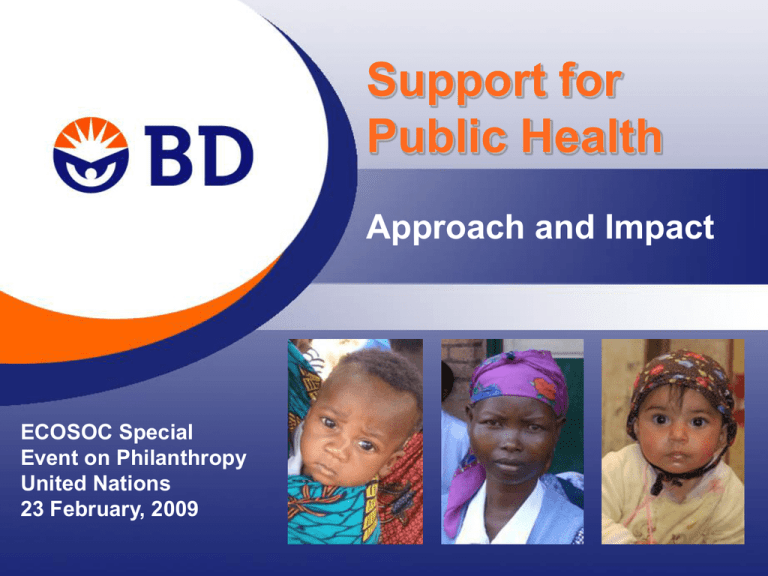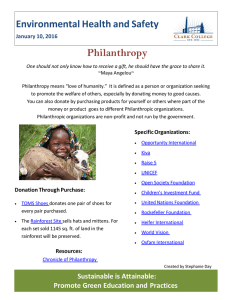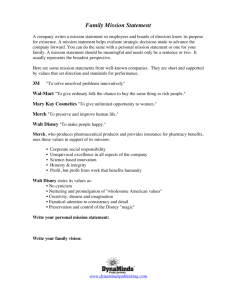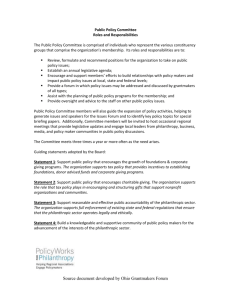Mr. Gary Cohen
advertisement

Support for Public Health Approach and Impact ECOSOC Special Event on Philanthropy United Nations 23 February, 2009 BD (Becton, Dickinson and Co.) • Medical technology company founded in 1897 • Global turnover US $7.2 billion in 2008 • 28,000 employees in over 50 countries • Company Purpose: Helping All People Live Healthy Lives • Culture of deploying capabilities for public health needs Life Sciences 16% 54% 30% Diagnostics Medical Devices Support for Public Health Areas of Focus • Immunization - Maternal & Neonatal Tetanus - Measles - Injection Safety • Infectious Disease - HIV/AIDS -Tuberculosis • Capacity Building - Health System Strengthening - Health Worker Wellness Support for Public Health Philanthropic Approach • Cash donation • In-kind donation of supplies and instrumentation • Volunteerism Philanthropic Approach Maternal and Neonatal Tetanus - UNICEF Philanthropic Approach Measles Partnership - American Red Cross Philanthropic Approach Millennium Villages Project - Earth Institute Philanthropic Approach Wellness Centres - International Council of Nurses Philanthropic Approach BD Volunteer Program - CMMB and Direct Relief Support for Public Health Technical and Business Approach Technology Access Sustainable supply of existing technology and development of new technology specifically for developing world needs Training & Knowledge Transfer Partnership with public, private and nonprofit sectors to strengthen health systems Advocacy and Policy Business sector engagement on issues involving child health and infectious disease Technology Access Safe Immunization of Over Five Billion Children Technology Access HIV Monitoring (CD4) - Clinton Foundation Training and Knowledge Transfer Laboratory System Strengthening - PEPFAR Advocacy and Policy Change TB Diagnostic Testing - FIND Need Find Photo Advocacy and Policy Change Injection Safety Advocacy and Policy Change HIV Spread From Child Exploitation Support for Public Health Cross-Sector Collaboration Support for Public Health Key Learnings from Experience • Companies can have positive impact across multiple intervention areas: - Outright philanthropy (cash and in-kind) - Institutional knowledge transfer, training, volunteerism - Sustainable access to existing products and technology - Development of new technologies specific to developing world needs • Strong collaboration skills are essential. Important for partners to have mutual trust and transparency regarding motivations. • Companies, even large ones, do not have unlimited amounts of discretionary funding available. Most will align funding to their areas of competency. • Causes most likely to attract funding will have clearly defined goals, measures, and ability to link impact directly to donor involvement. • Beyond recognition of social responsibility, private sector partners benefit from strong employee engagement around a higher sense of purpose. Support for Public Health Improving Outcomes for Women and Girls • An intersection of human rights, public health and sustainable development • Actions can be highly leveraged; interventions have a positive multiplier effect • Requires progress across multiple parameters; advocacy, resource deployment, physical and financial structures, laws (formal and informal), cultural belief systems, social norms, inter and intra family relationships • Demonstrated in groundbreaking work of Nobel Laureate Muhammad Yunis : - 100% school attendance, special scholarship program for girls - Separate sanitary facilities for girls in schools - Girls manufacture electronic parts for solar panels - Girls establish village health management centers - Micro-financing for women to own their own homes • Nike Foundation "Girls Count" Initiative another impressive example




